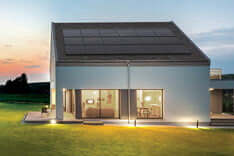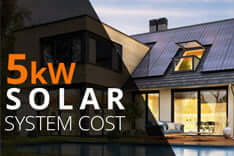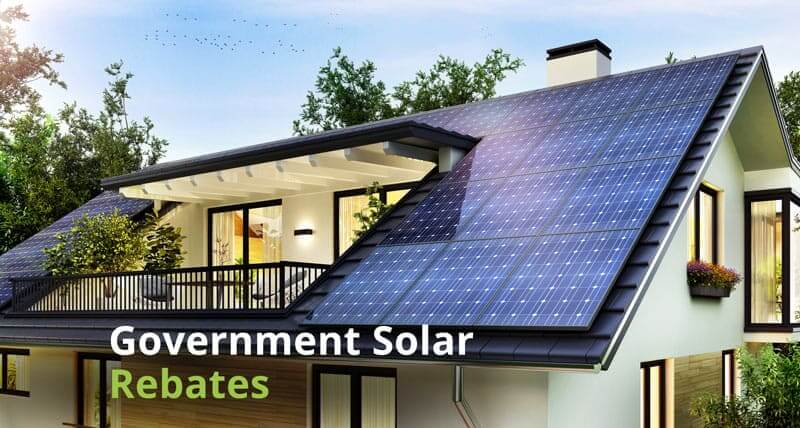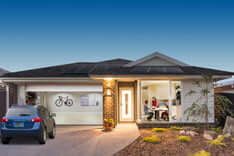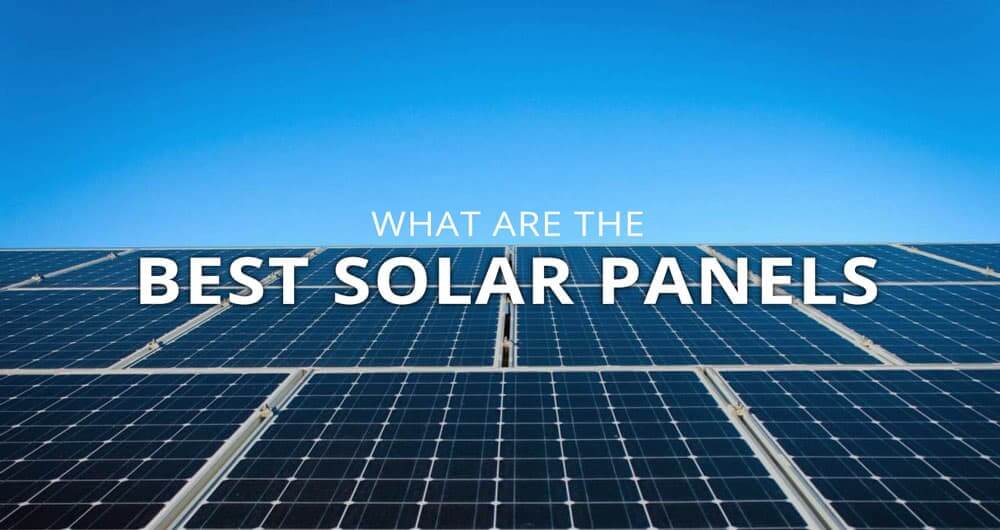Home Reviews CSUN Solar Panels Review
CSUN Solar Panels Review
Read our review guidelines
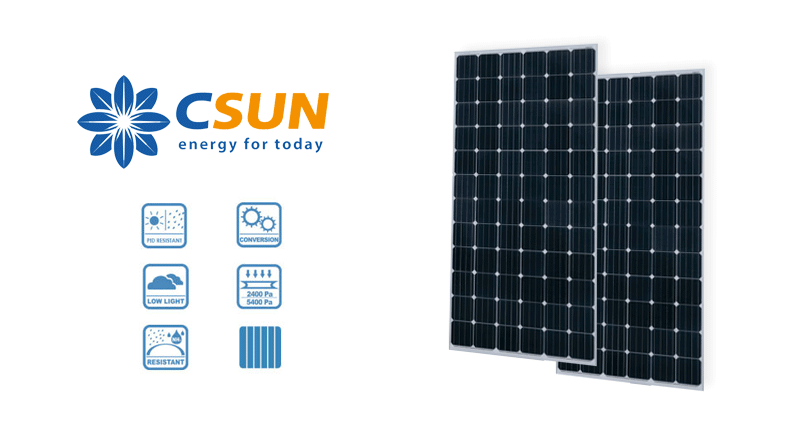
CSUN, or China Sunenergy to your mates, ranks right up there when discussing global top-dog solar panel manufacturers. They’ve spread their kit far and wide – covering China, the USA, Turkey, South Korea, and Vietnam, banging out an impressive 2.5GW of solar panels annually. Mate, if you’re dead set on getting the scoop on the big guns in solar power, CSUN’s your go-to. They’re absolutely smashing it in the solar sector. Stick around, and you’ll figure out why siding with them shines a smart move.
The company produces high-efficiency Tier 1 solar panels with a low-temperature coefficient 1.
Table of Contents
ToggleWhy CSUN solar panels?
CSUN solar panels boast a high module efficiency of 20.4%, which is close to top brands like LG 2, SunPower, and Winaico 3 solar panels. The low-temperature coefficient, 0.423%, makes them excellent for all parts of Australia.
The products come with a 10-year product warranty, the industry standard. Also, the manufacturer provides a 25-year linear performance warranty to ensure your safety. However, a 10-year product warranty is far behind a 25-year product and performance warranty offered by premium brands such as LG and Panasonic 4.
Quality of the CSUN Solar Panels
Most of the reviews I have read for CSUN solar panels confirm my opinion about these solar panels. The quality of the products is fairly decent, considering they are made in China. I’m saying this because in my work I have dealt with a couple of China-made products that barely withstand the Australian winds.
Additionally, according to CSUN’s official datasheets 5, all of their models have the following characteristics:
- Module Fire Performance: Type 1 (UL 1703) 6,
- Fire Resistance Rating: Class C (IEC 61730) 7,
- Passed salt mist and ammonia corrosion, blowing sand and hail testing,
- They are certificated to withstand wind at 2400Pa and snow load at 5400Pa,
- Works well under weak light conditions.
Clean Energy Council Approval
The bad news about CSUN Solar panels is that none of their solar panels have been approved by the Clean Energy Council 8 since 2019. This means they are not eligible for Australia’s Government solar rebate 9.
However, CSUN works on this issue and they plan to incorporate all the recommendations by the CEC and get back on the list.
PV Evolution Labs Top Performer - 2023
The CSUN solar panels are not listed on the PV Evolution Labs Top Performer for 2023 10. This doesn’t mean that they fail to be on the list since these are voluntary tests and the manufacturers pay to participate.
Participation in these tests is good for solar manufacturers because it is internationally renowned and is an accurate reflection of the solar panel’s performance. The test is in several categories such as:
- Thermal Cycling (TC),
- Damp Heat test (DH),
- Mechanical Stress Sequence (MSS),
- Potential-Induced Degradation (PID),
- Light-Induced Degradation + Light-and-Elevated Temperature -Induced Degradation (LID+LETID), and
- PAN Performance.
CSUN Panels Series
According to their official website, CSUN produces only Mars series Half-cell solar modules at the moment. The table below shows the technical specifications of the CSUN panels.
| CSUN670 | CSUN550 | CSUN460 | CSUN505 | CSUN460 | CSUN380 | CSUN600 | CSUN610 | |
| Cells Number | 132 cells | 144 cells | 144 cells | 132 cells | 120 cells | 120 cells | 156 cells | 120 cells |
| Cell Type | Monocrystalline Semi-cells | Monocrystalline Semi-cells | Monocrystalline Semi-cells | Monocrystalline Semi-cells | Monocrystalline Semi-cells | Monocrystalline Semi-cells | Monocrystalline Semi-cells | Monocrystalline Semi-cells |
| Power Output | 670W | 550W | 460W | 505W | 460W | 390W | 600W | 610W |
| Solar Panel Efficiency | 21.60% | 21.28% | 21.16% | 21.27% | 21.26% | 20.60% | 21.40% | 22.60% |
| Annual Power Degradation | 0.55% | 0.55% | 0.55% | 0.55% | 0.55% | 0.70% | 0.55% | 0.55% |
| Dimensions | 2384 × 1303 × 35 mm frame thickness upon request | 2279 x 1134 x 35 mm frame thickness upon request | 2094 x 1038 x 35 mm frame thickness upon request | 2094 x 1134 x 35 mm frame thickness upon request | 1909 × 1134 × 35 mm frame thickness upon request | 1735 × 1038 × 35 mm frame thickness upon request | 2465 × 1134 × 35 mm frame thickness upon request | 2172 × 1303 × 35 mm frame thickness upon request |
| Weight | 34.5 kg | 29.1 kg | 23.5 kg | 26.3 kg | 24.2 kg | 19.5 kg | 31.5 kg | 31.5 kg |
| Product Warranty | 12 years | 12 years | 12 years | 12 years | 12 years | 10 years | 12 years | 12 years |
| Performance Warranty | 25 years | 25 years | 25 years | 25 years | 25 years | 25 years | 25 years | 25 years |
| Operational Temperature Range | -40~+85º C | -40~+85º C | -40~+85º C | -40~+85º C | -40~+85º C | -40~+85º C | -40~+85º C | -40~+85º C |
Cell technology
CSUN solar panels utilise PERC (Passivated Emitter and Rear Contact 11) cell technology, which enhances traditional cells conventional solar cells have two silicon layers called p-type and n-type. Although these cells are highly effective, they may lose efficiency due to low electron movement and overheating.
PERC cells contain an extra dielectric passivation layer on the rear side of the cell. This allows more sunlight rays to be captured and provides higher electricity output. PERC cell technology also prevents longer wavelengths from being turned into heat which decreases the efficiency of the solar panels.
Australian office?
CSUN claims to have an Australian office. The registered is Level 57 MLC Centre Martin Place, Sydney NSW 2000, but if you try to Google this location you will get the result that it is permanently closed 12.
However, even though CSUN’s solar panels are tier one, the lack of an Australian office won’t give you piece of mind. Look for a brand within your budget that has an Australian office.
Why an Australian office is important?
Most of the foreign solar panel manufacturers who enter the Australian market have the priority to set up the distribution channels. Unfortunately, the customer care service comes last although both processes should be parallel.
Companies should care more about this because relying just on solar installers is not the right solution. I have seen many residential installers shutting down their business within the warranty period of the system they had installed. This leads to unhappy customers.
FAQ's
Yes, CSUN solar panels are Tier 1. Although the company is currently facing financial problems, it is striving hard to be stable again. The company offers a 10-year product warranty and a 25-year linear performance warranty. More so, the panels are corrosion-resistant, which makes them a reliable installation across Australia.
China Sunenergy (CSUN) produces CSUN solar panels, which are one of the best in the market. CSUN is a mid-sized company that claimed to have a 1.3 gigawatts production capacity in 2016 and sold over 3 gigawatts of panels in total.
CSUN solar panels are manufactured in Shanghai and Nanjing in China. This company also has manufacturing plants in South Korea and Vietnam and a panel assembly facility In Istanbul.
CSUN solar panels last for 25-30 years, but this does not mean they stop producing energy at this point. These panels have excellent performance under weak light conditions. They also have an excellent temperature coefficient that gives them a high power output during hot climates. CSUN panels are, therefore, an excellent investment due to their durability and reliability.
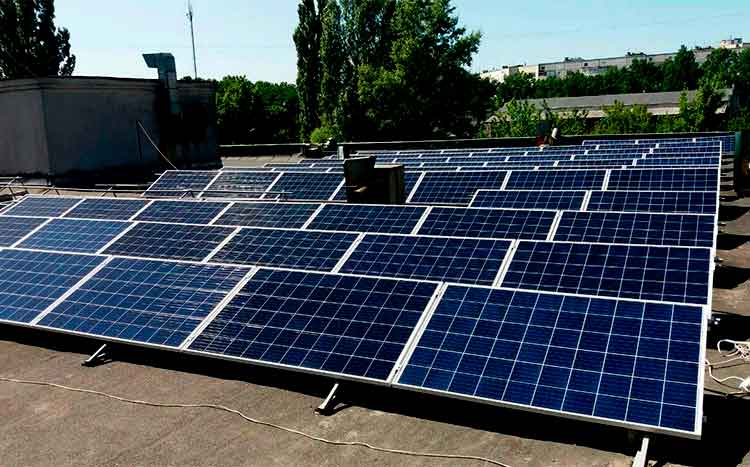
- Ben Mclnerney, (2023) Solar Panel Temperatures: When Affects Efficiency (Coefficient) <https://gosolarquotes.com.au/solar-panel-temperatures/> Accessed: 28-01-2024
- Ben Mclnerney, (2023) LG Solar Panel Review <https://gosolarquotes.com.au/review/lg-solar-panels/> Accessed: 28-01-2024
- Ben Mclnerney, (2023) Winaico Solar Panel Review <https://gosolarquotes.com.au/review/winaico-solar-panels/> Accessed: 28-01-2024
- Ben Mclnerney, (2023) Panasonic Solar Panel Review <https://gosolarquotes.com.au/review/panasonic-solar-panels/> Accessed: 28-01-2024
- CSUN SolarTech, (2021) Products <https://www.csunsolartech.com/products?typeCode=HALF_CELL> Accessed: 28-01-2024
- UL Solutions, (2023) UL1703/UL61730 – PV Module Safety Standards Updates: Making the Transition <https://www.ul.com/news/ul1703-ul-61730-pv-module-safety-standards-updates-making-transition> Accessed: 28-01-2024
- TUV Rheinland Energie und Umwelt GmbH, (2011) Requirements for Photovoltaic Modules Tested under Fire Conditions According to IEC 61730-2 <https://energiaoffgrid.files.wordpress.com/2014/04/iec_61730-2_firetest_tuv-solar-modules.pdf> Accessed: 28-01-2024
- Clean Energy Council, (2024) Approved Modules <https://www.cleanenergycouncil.org.au/industry/products/modules/approved-modules> Accessed: 28-01-2024
- Ben Mclnerney, (2023) Solar Panel Rebate: Reducing Upfront Cost of Solar Panels <https://gosolarquotes.com.au/rebate/> Accessed: 28-01-2024
- PVEL, (2023) The 2023 Top Performers <https://scorecard.pvel.com/top-performers/> Accessed: 28-01-2024
- AuroraSolar, (2018 published-2024 updated) What you need to know about PERC solar cells <https://aurorasolar.com/blog/what-you-need-to-know-about-perc-solar-cells/> Accessed: 28-01-2024
- www.google.com.au, (2024) Search results <https://www.google.com.au/search?q=csun+solar+panels+Martin+Place%2C+Sydney%2C+NSW&sca_esv=596971449&source=hp&ei=WZ-dZbH7Ede_xc8P2OCaoA4&iflsig=ANes7DEAAAAAZZ2tace7KdwXiEk70Ao4ySapmZ27JE4P&ved=0ahUKEwjxi-GFhtGDAxXXX_EDHViwBuQQ4dUDCAo&uact=5&oq=csun+solar+panels+Martin+Place%2C+Sydney%2C+NSW&gs_lp=Egdnd3Mtd2l6Iitjc3VuIHNvbGFyIHBhbmVscyBNYXJ0aW4gUGxhY2UsIFN5ZG5leSwgTlNXMgUQIRigAUiBIlAAWJsfcAB4AJABAJgB_AGgAdYWqgEGMC4xNS40uAEDyAEA-AEB-AECwgIFEAAYgATCAgsQLhiABBjHARjRA8ICBRAuGIAEwgILEC4YgAQYxwEYrwHCAgcQLhiABBgKwgILEAAYgAQYigUYhgPCAgYQABgWGB4&sclient=gws-wiz> Accessed: 28-01-2024
Table of Contents
Toggle
